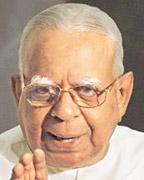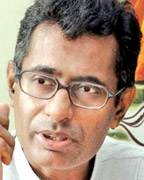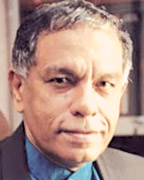|
Modi's visit :
A strategic move to ensure power devolution
By Manjula Fernando
Given almost all previous state visits by leaders of our giant
neighbour that revolved round the issue of North and East Tamils, it is
unwise to contemplate that Prime Minister Narendra Modi would give this
issue less prominence during the high profile visit to Sri Lanka which
he concluded yesterday.
Although the mounting China influence in its backyard may have
prompted the Indian leader to undertake the visits to the three
strategic island nations that dot the Indian ocean, he was expected to
take up the issue of Tamil minorities and the devolution of power to the
North and East at the highest level here.
His itinerary for Friday included separate meetings with the Tamil
political parties representing the up country Tamils and the TNA.
Known for his charismatic influence, the Tamil political parties are
hopeful that this visit may help bring in a finality to the long dragged
issue.
Speaking to the Sunday Observer on the eve of Prime Minister Modi's
visit, TNA leader R. Sampanthan said, 'There is great expectation that
there could be a final, reasonable resolution to our problem... that is
acceptable to all the people of this country'.
However, JHU General Secretary Patali Champika Ranawaka cautioned
against any move by India to broker a deal between the Government and
the Tamil parties at a time when the ground has been cleared for a
genuine domestic effort to find a lasting solution to the ethnic issue.
The SLMC General Secretary Hasan Ali, said they wanted the 13th
amendment to the constitution be fully implemented and any process of
finding a lasting solution should also treat Muslims as an equal stake
holder. That would be their message to the visiting leader.
TNA Leader R.Sampanthan:
 |
|
R.Sampanthan |
"It had been accepted by almost every political formation in this
country that the arrangements presently existing in regards to sharing
powers of governance, are not complete. Presently the arrangements exist
in terms of the 13th amendment to the constitution and Provincial
Councils Act. After the enactment of these two, various governments
under various presidents had taken action to improve on the situation.
President Ranasinghe Premadasa did so under the Mangala Moonesinghe
committee, which recommended power sharing on the Indian model, together
with, if necessary, an apex council to the North and East.
"During President Chandrika Kumaratunga's time, there were far-
reaching efforts for devolution in 1995, 1997 and 2000.
And a bill was presented in parliament which contemplated maximum
devolution with the doing away of the concurrent list.
"Thereafter, during President Mahinda Rajapaksa's time, he made a
very progressive speech when he addressed the APRC and the experts
committee he appointed in 2006. The experts committee recommendations
were more or less on the same basis as the proposals of President
Chandrika's committee.
"The Sri Lankan government had made several commitments to the Indian
government and the international community that they will fully
implement the 13th amendment and build upon it to bring about a
meaningful devolution. This has been an ongoing process, which has not
yet come to an end.
"One of the points that we could raise with prime minister Modi is
that there must be a finality in regard to these matters. Power sharing
arrangements must be finalised in such a way, within the framework of a
united, undivided Sri Lanka, to which we have committed and on which
there cannot be a compromise.
"There would be adequate power sharing arrangements to enable people
to be able to determine their destiny in the territory in which they
live.
"When asked about the new 'dynamic system of devolution of power'
being proposed by the Northern Province Chief Minister, the TNA leader
said, he did not wish to talk about new things and old things. "Nothing
is new, nothing is old, it's all part of a continuing process. What
eventually emerges must be reasonable, workable and durable. That's all
I am concerned about."
"India has always been involved in Sri Lanka's national question
since 1983. There has been the Indo-Lanka peace accord signed in 1987.
It was within the framework of a united, undivided Sri Lanka with an
unequivocal commitment to the country's unity and territorial integrity
that defined the contours of a political solution.
"Therefore President Modi's visit to Sri Lanka is part of a
continuing process.
"Prime Minster Modi is believed to be a 'go getter', a person who
believes in getting things done, there is great expectation that during
his time and during Maithripala Sirisena's time, there could be a final
reasonable resolution, acceptable to all the people of this country."
General Secretary Jathika Hela Urumaya (JHU) Patali Champika Ranawaka:
 |
|
Patali Champika Ranawaka |
"India should not be dragged into this problem. Tamil politicians,
particularly the TNA is always attempting to drag India into this issue.
Since S.J.V.Chelvanayakam's time they have been trying the Tamil Nadu
factor to bargain their so-called Tamil eelam.
"I think they should look into this country as a separate, unique
nation. They should not look into this through the lens of Tamil
separatist parties. That is JHU's stance.
"I think Tamil parties and politicians should use this window of
opportunity that has been created on January 8, 2015 to have a genuine
dialogue between other communities and moderate leaders in the Tamil
polity. In that they should change their attitudes, they should not
pursue the idea of power devolution on the lines of an exclusive Tamil
homeland concept and self determination.
They chose this path in the history and brought about heavy
destruction to the country.
"Thousands of people were killed before it ended in Nanthikadaal in
May 2009. If they tread the same path, the consequences will be
disastrous. We don't want such a situation created.
There are democratic ways of doing things, they should act within a
democratic framework and they should accept these democratic norms.
"We accept cultural diversity but not cultural segregation. We accept
political identities of various parties but not separatist ideology. We
accept Tamil people's separate ethnic identity but not as a separate
nation.
SLMC General Secretary Hasan Ali:
 |
|
Hasan Ali |
"The Indo Lanka Peace Accord was signed because the government wanted
to restore democracy in the Northern region. Numerous terrorist groups
were operating in the region at the time this was proposed and they were
killing the democratic leaders, the innocent political leadership.
"The original text of the amendment did not speak of the Muslim
community, not a word was mentioned. SLMC leader A.H.M.Ashraff strongly
criticised the amendment that it deprived the Muslims a separate
identity. But with all those anomalies we supported and contested the
elections, because we wanted the democracy to prevail.
"I was one of the members elected to the North-Eastern provincial
council in 1988. When Varadaraja Perumal declared Tamil Eelam in the
North and East, we opposed his move and walked out. There were no others
to stage a protest in the Council.
"All past presidents gave a lot of promises to the people. They said
the 13th amendment will be fully implemented but it never materialised.
There is a moral obligation on the part of the Indian Government and the
Sri Lanka government to see that this is fully implemented.
"People living in the peripheries must be given the right to manage
their affairs on their own without any pressure from the centre. The
democracy must be given its true meaning.
The original stand of the SLMC was when the Northern and Eastern
provinces were merged by the Indo-Lanka peace accord, we vehemently
criticised the move. A merger or a de-merger has to be conditional and
it cannot be done to simply satisfy a particular community.
"The Muslims also suffered a lot, we lost our property, the ethnic
cleansing of the Muslims took place in the North at that time. Our
border villages were destroyed and the Muslims were gunned down while we
were in prayer.
"We are a separate community and our grievances should also be
addressed. If a solution is to be brought about, the Muslim community
should also be considered equal stakeholders. If they are going to
re-merge the North and East again it is conditional. They should carve
out a separate province for the Muslim community." |

